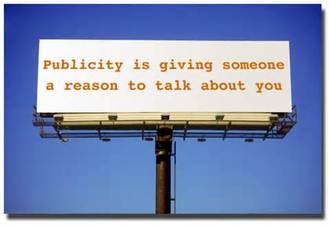I am often asked about ways to market a product without spending a fortune. We all believe our product or service is "newsworthy," right? The key is to fine-tune your pitch -- just as you would to attract a new client and seek out the WIIFT -- What's In It For THEM. Figure that out before you make your pitch, consider what other "experts" would be good for the reporter to interview, and be sure you're pitching the idea to the right person. Publicity is viewed as being much more powerful than a straight advertisement, so it's worth the effort - and it doesn't cost a cent but sweat equity. Here are some other ways to generate publicity for your business.
1.Have an angle or hook. There's not one of us who doesn't think our business or idea is newsworthy, but really think about that. Who would this appeal to? Why? What interest is this story to the reader, viewer or listener? Think those things through before you pitch your idea. Piggyback off of current trends in the news today and increase your chances of gaining media interest.
2.Know where you want your message to land. Where would it make the most sense for you and your company to be featured? Are your clients and prospects reading or seeing these media outlets? Start paying more attention to stories that relate to your client's industries and how you could offer a "second opinion."
3.Know whom you need to contact with your story idea. Keep a file of interesting news stories and identify who's writing these stories. Oftentimes, you can easily see how to reach out and contact them via email. Think about sending a quick note out to them and commenting or offering an opinion (not an offensive one) about what they wrote. You may be a new resource for them to call upon.
4.Do your homework. Be sure not to spell a reporter's name incorrectly, know what their "beat" is, and keep in touch in a relevant way -- by sending them information they truly might be interested in. Think of the press as you would a prospect -- be on point and respectful of their time and needs. Know the day of their deadline and don't call or email on that day for obvious reasons.
5.Write an effective press release. There are many resources out there to follow the template or format of a press release. Be sure to have a compelling headline, offer the who, what, where, when, why in the first paragraph and offer a compelling quote and closing paragraph about your business - written in the third person.
6.Write a sidebar or Top 10 list. I, like David Letterman, love a Top 10 list and it's a great way to grab the attention of not only the press, but the readers as well (just like this one).
7.Suggest or provide photos. A picture paints a thousand words and it's true that more people will read something when it is accompanied by a visual image -- like a photo or drawing. Take your own (ideally from a professional) or suggest to the reporter or editor that they send someone to photograph. Be sure your office and surroundings are picked up and "camera-ready" as are you!
8. Follow-up. Just as in sales - it's all in the follow-up. Do not be offended by the media not returning calls or emails -- they're extremely busy. The better job you do with the previous steps the higher your chances are of getting their attention and therefore, a positive response.
9. Act as a resource. When you've made contact with the press, act as a trusted resource and offer them other people to interview for the story (non-competitors, but people who will enhance the overall storyline). They'll be grateful for your help in pulling the story together and if you continue to send them sources they can interview, you'll be a life-long friend.
10.Thank them. Rarely does the media get thanked for the job they do. Typically, the pay is not great and the hours are long. Journalists are a lot like artists. They write because they love it -- not because it's lucrative. Write a personal hand written thank you note. They'll appreciate it and will most likely call on you again for commentary.
Let me help you reinvent your business without breaking the bank - visit my website and sign up for my FREE Reinvention eGuide.
